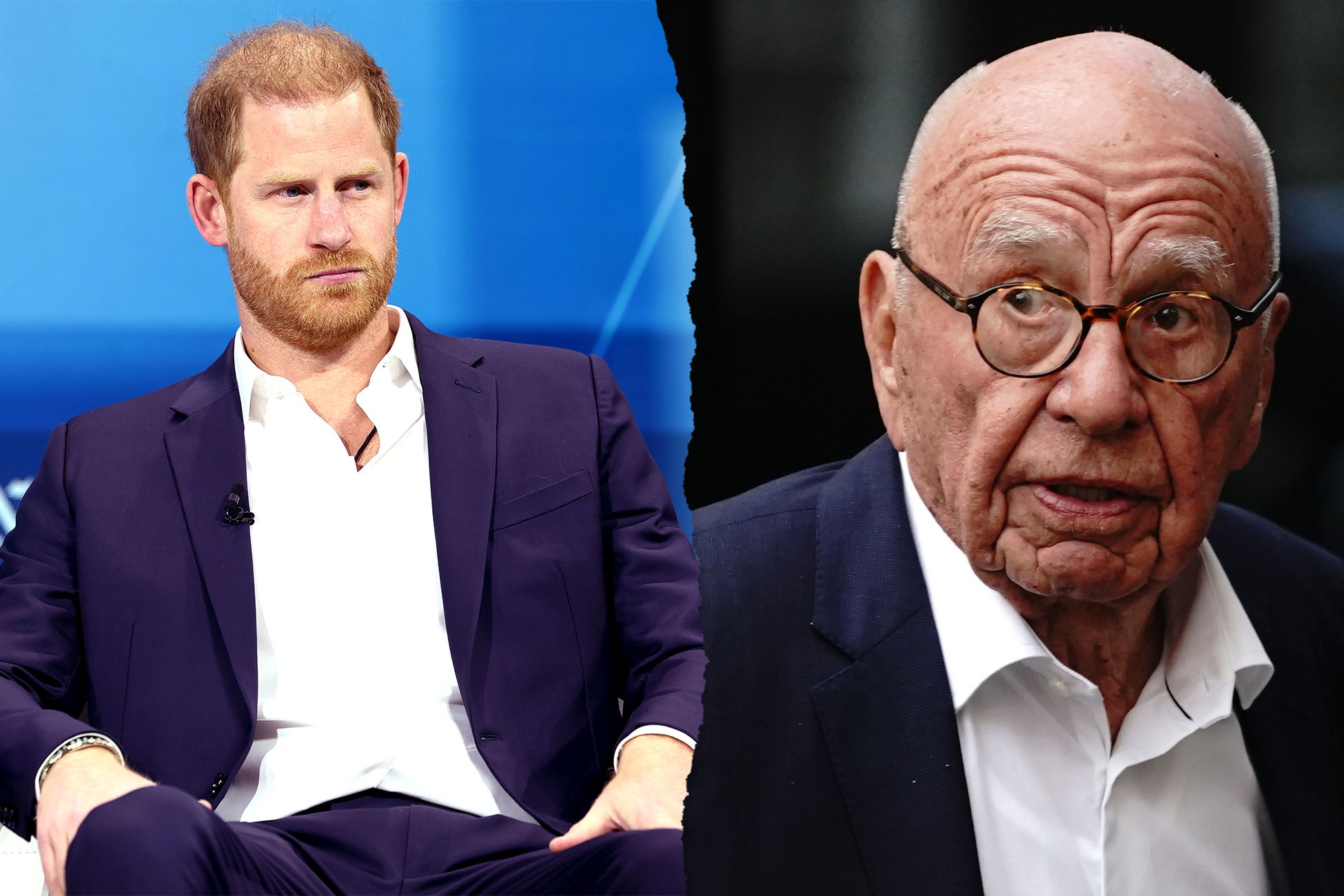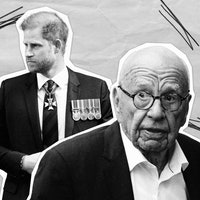Justice Timothy Fancourt, not a judge who easily loses his cool, was exasperated. Addressing the counsel facing him in London’s High Court, he snapped, “[There is] no question of that happening.”
The counsel, Anthony Hudson, was leading the team of lawyers representing Rupert Murdoch’s News Group Newspapers (NGN) in the civil case brought against them by Prince Harry, the Duke of Sussex, at a critical moment in December when the judge was deciding how much evidence could be heard in an eight-week trial that will open on January 20.
It was a rare moment of open tension in a court where, by ancient custom, the opposing lawyers refer to each other as “my learned friend” and address the judge as “my lord,” even though Fancourt is not a lord, just Sir Timothy.
Hudson was asking for the trial to be delayed, complaining that there was not enough time for NGN’s legal team to prepare. “I don’t know which witnesses are going to be called or when, I don’t know which documents are going to be relied on,” he said, according to transcripts obtained and reviewed by Vanity Fair.
The judge was having none of it, reminding Hudson that “the parties have had years to get ready for this trial.”
He had a point. In its duration and complexity, this long-running saga has acquired something of the flavor of the notorious Jarndyce v. Jarndyce in Charles Dickens’s novel Bleak House, a case so protracted that the litigants become mutually impoverished while the lawyers grow fat on their fees. (Before he was a novelist, Dickens was a court reporter in this same precinct of London and was witness to similar predations.)
The narrative now is, of course, of another age and different in its plotting. There had long been doubt about whether Harry would hold out for a trial rather than settle. As Hudson himself explained to the court: “More than 1,300 claims have been settled. NGN has repeatedly demonstrated its willingness to settle claims brought against it and more than properly compensated claimants.” He seemed to be arguing that it was unreasonable of Harry to actually do what he always said he intended to do: hold the Murdoch empire publicly accountable for one of the most squalid episodes in the history of British journalism, in which hacking and so-called “blagging”—the obtaining of information through deceptive means—were allegedly widely used to violate the privacy of public figures and in attempts of kompromat against politicians considered hostile to the Murdoch interests.
However, as it has turned out, Harry’s case does not involve phone hacking. He cites 30 articles and 20 incidents, dating between 1998 and 2011, in which he claims that private investigators violated his privacy. Together this involves 16 PIs and 23 journalists. The case does include allegations of blagging, specifically in stories alleging habitual drug use by Harry that his lawyer, David Sherborne, told the judge in December were untrue, even though, according to Sherborne, Rebekah Brooks, the chief executive of the Murdoch papers at the time, had assured Buckingham Palace that they were supported by evidence.
But hacking is still cited by the other remaining claimant whose case is included in the trial. Tom Watson, a former Labour Party member of parliament since elevated to the House of Lords as “Lord Watson of Wyre Forest,” was a prominent adversary of the Murdoch tabloids. His claims describe the alleged cost to him in the form of retaliatory actions taken against him. Watson broke from other politicians who decided to settle, insisting, like Harry, that he wanted a trial in the public interest. One of the witnesses to be called by Watson is the former prime minister, Gordon Brown, and both politicians are determined to prove the complicity of senior executives.
Indeed, Hudson’s request to delay the trial was not related to either the Harry or Watson claims, where the details are well-rehearsed and agreed on between the parties, but to the first weeks of the trial that do not include those claims.
Instead, this time will be devoted to what is referred to in a bland technical term as “generic issues.” This is where the real reputational threat to the Murdoch empire lies—like a ticking bomb.
Sherborne has all along insisted that the trial should begin, not narrowly with the specific cases, but by drawing on evidence gathered in years of discovery, revealing that the Murdoch tabloid newsrooms allegedly deployed hacking, blagging, and private investigators at such a scale that it became institutionalized and that, Sherborne has argued, this could never have happened without the knowledge and direction of senior Murdoch executives. That charge flows directly into another: that once the scandal was exposed, there was an alleged conspiracy to destroy or conceal evidence describing how extensive it was and—critically—to conceal how far up the executive tree the knowledge of it went. In classic forensic terms: Who knew what and when did they know it?
This is the last thing that Murdoch and his top executives want to happen. Hudson has made repeated objections to these generic issues being aired at all, claiming that they are irrelevant to the specific claimant cases of Harry and Watson, and arguing that Sherborne was trying to turn the trial “into something akin to a public inquiry.” Then, in December, when requesting the delay, he complained that there were 200,000 pages of documents for him to digest, many of them witness statements. Fancourt, in response, turned that problem back on Hudson and his team: “The defendant did a lot of work but it was rather ill directed in producing an unwieldy and far too detailed schedule.”
Fancourt had long ago accepted that, in principle, it was relevant to allow Harry’s lawyers to build a picture of the modus operandi of the tabloids. But he was gimlet-eyed on what he would allow Sherborne to introduce in evidence and what he would not. It was therefore inevitable that Hudson would fail in his last-minute bid to keep the allegations from becoming public.
And so it is that the trial will open as a journey through an extraordinary time capsule stretching back as far as 27 years in which the original scandal now seems locked in the past world of old media.
The two Murdoch tabloids, the Sunday News of the World and The Sun, a daily, were in a race to the bottom with rivals at the Daily Mirror and Daily Mail. The Murdoch papers won that race by miles, becoming remarkable scoop machines. But the market for short-attention-span sensationalism was being increasingly atomized by social media. The circulations of all the national newspapers in Britain have plunged in the last 15 years, but the tabloids have suffered the worst. The News of the World was closed in 2011 as a result of the hacking scandal; The Sun, which was once selling well above 3 million copies a day, is now selling around 700,000, according to the Press Gazette, although the tabloid no longer reveals the number.
For the main players who will be featured in the trial, it must feel like being present at the exhumation of the rotting corpse of a beast they once rode to great heights but now wish they’d never known. One of those could be Will Lewis, the publisher and CEO of The Washington Post, who is alleged to have directed efforts to disappear some of the most damning email records. Another is Paul Cheesbrough, Lewis’s wingman at the time, who now heads the Tubi Media Group in California, a thriving part of the Murdoch streaming business.
Cheesbrough, as the hands-on digital expert in the Murdoch empire’s London headquarters during the events in question, is emerging as a key witness in the trial. At the December hearing, Hudson revealed that over the years of discovery, NGN had served eight separate witness statements by him and that Harry’s lawyers want to cross-examine him for five to six hours. (Lewis had denied any wrongdoing and whether he will be called is not yet known.)
But at the end of it all, there is the man at the top, Rupert Murdoch. Last May, Judge Fancourt warned Sherborne against what he called trophy hunting—going after the 93-year-old mogul personally when, in the judge’s words, it would “add nothing to the allegations already made against other senior executives at NGN and its parent companies.”
It could be argued that that view is forgivingly myopic of how Rupert Murdoch has always operated—after all, he is the ultimate authority behind the whole enterprise, and that surely implies, as a matter of corporate governance, a high level of personal accountability.
For sure, the trial will throw a searing new light on the chain of command at the newspapers and significantly influence views of Murdoch’s legacy. The personal harm and pain inflicted on thousands by the hacking has never provoked any sign of remorse in Murdoch, any more than has the pollution of the news stream by Fox News. Murdoch doesn’t do remorse.
More Great Stories From Vanity Fair
Burning at Both Ends: Surviving a Week in Wildfire-Torn Los Angeles
MAGA-verse’s Clash of Titans
Lucy Liu Has No Regrets on Speaking Out About Bill Murray
Mark Zuckerberg Doubles Down on the MAGA-fication of Meta
Inside Trump’s Hush Money Sentencing
Alan Cumming Needs to Be Psychiatrically Evaluated
The Biggest Snubs and Surprises From the 2025 SAG Awards Nominations
The Best Rom-Coms of All Time
From the Archive: Portraits of Picasso’s Marriage


